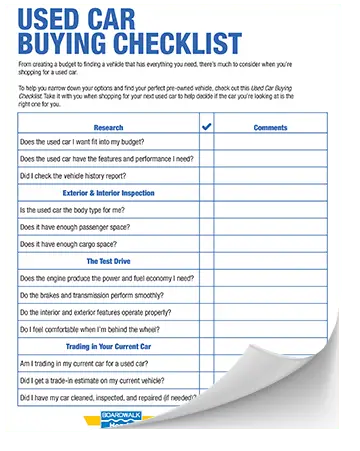Essential Paperwork for Buying a Car: Your Complete Guide

Buying a car is a significant decision, often involving a blend of excitement, anticipation, and for many, a fair amount of anxiety. While the joy of driving away in a new vehicle can be exhilarating, the path to that moment is paved with paperwork. Understanding the essential documents needed when purchasing a car can streamline your experience, ensure legal compliance, and protect you from potential future complications. Here’s a comprehensive guide to the paperwork involved in buying a car, whether it's new or used, through a dealership or from a private seller.
Types of Car Documents

- Bill of Sale
- Vehicle Title
- Registration
- Insurance Certificate
- Odometer Disclosure Statement
- Warranty Documents
- Vehicle History Report
- Financing Agreement (if applicable)
Bill of Sale

One of the first documents you’ll encounter is the Bill of Sale. This document is your proof of purchase, detailing the:
- Vehicle’s identification information including VIN (Vehicle Identification Number)
- Sale price
- Names and addresses of both the buyer and seller
- Date of sale
- Terms of the sale, like payment method
Ensure you keep this document safe as it can be used for tax purposes, insurance claims, or if there's ever a dispute regarding ownership or payment.
Vehicle Title

The Vehicle Title is arguably the most critical piece of paperwork. This document:
- Proves ownership of the car
- Contains the car’s make, model, year, VIN, and the owner’s name
When buying a car:
- A dealer will typically handle the transfer of title
- When buying privately, you must ensure the title is in the seller’s name and they sign it over to you
📝 Note: If the seller does not provide the title or it’s not correctly filled out, do not proceed with the purchase.
Registration

Registering the car is next, which involves:
- Filling out the registration forms provided by your state’s DMV
- Paying the registration fee
- Transferring the license plate (if your state allows)
- Getting new license plates if needed
Your car must be registered to drive it legally on public roads.
Insurance Certificate

Purchasing auto insurance is non-negotiable and must be done before you can drive your new car. The insurance certificate provides proof of:
- Liability coverage (mandatory in most states)
- Additional coverages like comprehensive, collision, etc.
You must present this certificate when registering the vehicle and carry it in the car at all times.
Odometer Disclosure Statement

This document states the mileage of the vehicle at the time of sale, helping to:
- Prevent odometer fraud
- Provide an accurate history of the car’s usage
This is especially important for used cars, where mileage can significantly impact the value.
Warranty Documents

If the car comes with a warranty, you’ll receive:
- The manufacturer’s warranty for new cars
- Extended warranties or certified pre-owned warranties for used cars
These documents detail what’s covered, for how long, and any conditions or limitations.
Vehicle History Report

Particularly when buying used, a vehicle history report from services like Carfax or AutoCheck can be invaluable, showing:
- Past ownership
- Accident history
- Title status (clean, salvage, etc.)
- Service records
This can help you make an informed decision about the condition of the vehicle.
Financing Agreement (If Applicable)

| Aspect | Details |
|---|---|
| Loan Terms | Interest rate, monthly payment, duration, etc. |
| Signatures | Your signature, co-signer’s signature if applicable |
| Lender Information | Name of the finance company or bank |

💡 Note: Always read the fine print before signing a financing agreement to avoid hidden fees or unfavorable terms.
With all these documents in hand, you've set yourself up for a smoother, legally secure car purchasing process. Understanding and keeping track of your paperwork ensures you can drive with peace of mind, knowing you've done everything correctly. Remember, this guide covers general requirements; specific regulations might differ by state or country, so always check local DMV rules to ensure you're in compliance with all legal stipulations.
As we wrap up, remember that while the excitement of getting a new car can often overshadow the paperwork aspect, these documents are the key to securing your ownership, ensuring your vehicle’s compliance with local laws, and protecting your investment. Taking the time to understand each piece of paperwork ensures that your car buying experience is smooth, secure, and sets the foundation for a worry-free ownership journey. Keep your documents organized, understand what each one means, and don't hesitate to ask for clarification from dealers, sellers, or your DMV. With this knowledge in hand, you're well-prepared to enjoy the roads ahead.
What if I lose my Bill of Sale or Title?

+
If you lose these documents, contact your DMV immediately to request replacements. A Bill of Sale can often be recreated by the seller or dealer if you maintain a good relationship with them.
Can I drive a newly purchased car home without plates?

+
Some states offer temporary plates or drive-out tags, allowing you to drive a newly purchased vehicle from the dealership without permanent plates for a short period. Always check local laws.
Is a vehicle history report necessary for a new car?

+
While not required by law for new cars, a history report can still reveal factory recalls or other pertinent information. However, for a brand-new car, it’s typically not as crucial as for used vehicles.





